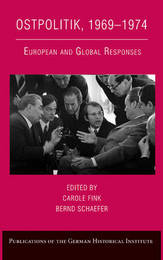
|
Ostpolitik, 1969-1974: European and Global Responses
Hardback
Main Details
| Title |
Ostpolitik, 1969-1974: European and Global Responses
|
| Authors and Contributors |
Edited by Carole Fink
|
|
Edited by Bernd Schaefer
|
| Series | Publications of the German Historical Institute |
|---|
| Physical Properties |
| Format:Hardback | | Pages:322 | | Dimensions(mm): Height 229,Width 152 |
|
| ISBN/Barcode |
9780521899703
|
| Classifications | Dewey:327.43047 |
|---|
| Audience | | Postgraduate, Research & Scholarly | |
|---|
|
Publishing Details |
| Publisher |
Cambridge University Press
|
| Imprint |
Cambridge University Press
|
| Publication Date |
22 December 2008 |
| Publication Country |
United Kingdom
|
Description
Studies of the Cold War transcend a narrow focus on four decades of superpower rivalry, recognizing that leaders and governments outside of Washington and Moscow also exerted political, economic, and moral influence well beyond their own borders. One striking example was the Ostpolitik of Chancellor Willy Brandt, which not only redefined Germany's relation with its Nazi past but also altered the global environment of the Cold War. This book examines the years 1969-1974, when Brandt broke the Cold War stalemate in Europe by assuming responsibility for the crimes of the Third Reich and by formally renouncing several major West German claims, while also launching an assertive policy toward his Communist neighbors and conducting a deft balancing act between East and West. Not everyone then, or now, applauds the ethos and practice of Ostpolitik, but no one can deny its impact on German, European, and world history.
Author Biography
Carole Fink, Distinguished Humanities Professor in History at The Ohio State University, and a specialist in European International History, is the author of three monographs, Defending the Rights of Others: The Great Powers, the Jews, and International Minority Protection, 1878-1938 (2004, paperback ed. 2006) and The Genoa Conference: European Diplomacy, 1921-1922 (1984, new paperback edition 1993), both of which were awarded the George Louis Beer prize of the American Historical Association, and Marc Bloch: A Life in History (1989), which has been translated into five languages. She has edited six volumes, including 1956: New Interpretations (2006), Human Rights in Europe since 1945 (2003), and 1968: The World Transformed (1998) and has written some fifty articles and chapters on contemporary European history. In 2007 she received the Distinguished Scholar award from The Ohio State University. Bernd Schaefer is a Senior Scholar with the Woodrow Wilson Center's Cold War International History Project (CWIHP) and specializes in international impacts of East Asian communism. He has worked extensively in the field of GDR history and its post-communist appraisal. Between 2001 and 2008 he has been a Research Fellow at the German Historical Institute in Washington D.C. and the Nobel Institute in Oslo. He holds a Ph.D. from the University of Halle in Germany (1998) and a master of public administration from the John F. Kennedy School of Government at Harvard University (1991), where he was a John J. McCloy Scholar. His publications include North Korean 'Adventurism' and China's Long Shadow, 1966-1972 (2005) and American Detente and German Ostpolitik, 1969-1972 (2004). His book Staat und katholische Kirche in der DDR, 1945-1989 (2nd edition 1999) is currently translated into English.
Reviews'On the issues and countries it covers, the book sheds considerable light ...' International Affairs 'A fascinating collection of essays accompanies this picture, and the strongest impression they leave is that of Brandt's perspicacity ... As a step toward globalizing our understanding of the Ostpolitik, this volume accurately reflects Brandt's times and Brandt's ambition. It is a first-rate contribution to the literature.' The Journal of Central European History
|